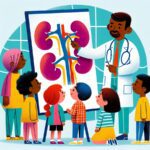Tuberous Sclerosis is a condition that might not be familiar to many, but for new parents facing this diagnosis, it becomes a crucial part of their vocabulary. This genetic disorder can affect multiple systems of the body, leading to the development of non-cancerous tumors in various organs. Understanding Tuberous Sclerosis is essential for providing the best care for your child. In this article, we will explore what Tuberous Sclerosis is, its symptoms, diagnosis, and treatment, and how to manage care for a child affected by this condition.
What is Tuberous Sclerosis?
Tuberous Sclerosis, also known as Tuberous Sclerosis Complex (TSC), is a genetic disorder characterized by the growth of benign tumors in various parts of the body, including the brain, skin, heart, eyes, kidneys, and lungs. These tumors can lead to a variety of health problems, depending on their location and size. TSC is caused by mutations in one of two genes, TSC1 or TSC2, which are involved in cell growth regulation. This condition is often detected in infancy or early childhood, although the severity of symptoms can vary widely among affected individuals.
For more information on genetic disorders that might affect your child, consider reading about Genetic Disorders.
Early Signs and Symptoms of Tuberous Sclerosis
Identifying the early signs and symptoms of Tuberous Sclerosis is key to timely diagnosis and management. Common symptoms include skin abnormalities, such as white patches or thickened skin, seizures due to brain tumors, developmental delays, and behavioral issues like autism. Some children may also have kidney problems, lung complications, or heart issues at birth. It’s important to monitor your child’s development closely and consult with a healthcare provider if you notice any unusual signs or symptoms.
Understanding developmental milestones can help you recognize potential delays in your child. For more insights, visit our page on Developmental Milestones.
Diagnosing Tuberous Sclerosis
Diagnosing Tuberous Sclerosis involves a comprehensive evaluation of symptoms, family history, and a series of diagnostic tests. These may include genetic testing to identify mutations in the TSC1 or TSC2 genes, magnetic resonance imaging (MRI) scans of the brain to detect tumors, and ultrasounds or echocardiograms to examine the heart and kidneys. An accurate diagnosis is crucial for developing an effective treatment plan and monitoring the progression of the condition.
For families navigating the complexities of genetic testing, our article on Genetic Disorders offers valuable guidance.
Treatment Options for Tuberous Sclerosis
While there is no cure for Tuberous Sclerosis, treatment focuses on managing symptoms and preventing complications. Medications may be prescribed to control seizures, and surgeries or other interventions might be necessary to address tumors or other problems in the kidneys, brain, or other organs. In addition, early intervention programs and therapies can support developmental needs, including physical, occupational, and speech therapy.
It’s also important for parents to stay informed about the latest research and treatment options. The Tuberous Sclerosis Alliance is a valuable resource for families, offering support, education, and advocacy.
Supporting a Child with Tuberous Sclerosis
Raising a child with Tuberous Sclerosis can present unique challenges, but with the right support and resources, families can navigate this journey successfully. Establishing a strong support network, including healthcare providers, therapists, and support groups, is essential. Embracing a positive outlook, celebrating small victories, and advocating for your child’s needs can also make a significant difference in their quality of life.
For more information on supporting children with special needs, consider exploring our resources on Autism and Developmental Milestones.
In conclusion, Tuberous Sclerosis is a complex condition that requires a comprehensive approach to care and management. By staying informed, seeking early intervention, and building a strong support network, parents can help their children lead fulfilling lives. Remember, you’re not alone in this journey, and there are many resources available to help you and your child navigate the challenges of Tuberous Sclerosis.













